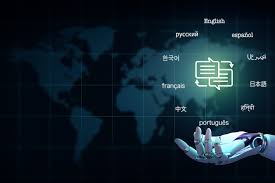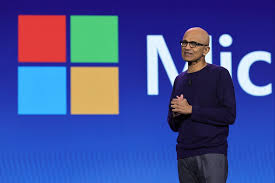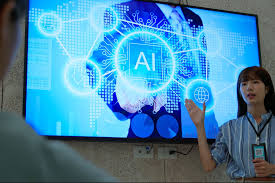From Tesla to Amazon and more, don’t miss a beat when it comes to the business world. Keep up with all of the latest in business news here.

Microsoft Interpreter Will Have You Speaking Nine Languages on Teams Next Year
Interpreter AI converts your voice into nine different languages in real-time on Microsoft Teams calls. You may be speaking in English, but to your colleague in Paris tuning into the Microsoft Teams meeting, you’ll sound like you’re talking in French.
Microsoft is currently testing a new Interpreter AI feature that clones your voice and converts it to another language in real-time. The result is a voice that sounds “just like you in a different language,” according to the company. The translating program will be previewed early next year with up to nine languages, including Italian, German, Japanese, Korean, Portuguese, French, English, Mandarin Chinese, and Spanish. Only accounts with a Microsoft 365 Copilot license will be able to access Interpreter, per The Washington Post.

Amazon Wants to Deliver Packages Faster With Secret Smart Glasses. Here’s How.
Meta’s Ray-Ban smart glasses proved to be a hit with more than 700,000 pairs sold, which is inspiring rivals like Apple to eye the same space. Now, Amazon is reportedly also designing smart glasses—but not for customers. Instead, the company unlocked a new use case for the tech: faster deliveries.
According to a Monday Reuters report, Amazon is making smart glasses for its drivers that could save time and cut down on the overall cost it takes to deliver packages, making the final mile between an order and a shopper’s residence easier to manage. Amazon spent $89.5 billion on shipping costs in 2023, a new high from $83.5 billion the year prior.

Nissan Is Cutting 9,000 Jobs—And Slashing Its CEO’s Pay in Half
In 2022, Makoto Uchida’s salary was approximately $4.5 million. Japanese automaker Nissan reported a loss on Thursday for the fiscal quarter, leading the company to announce it is cutting 9,000 people, around 6% of its workforce. Nissan models did not sell well in the U.S. last quarter.Makoto Uchida, Nissan’s CEO, told reporters that he is taking the situation “very seriously,” according to the AP—and cutting his salary in half.

Hybrid Workers Were Put to the Test Against Fully In-Office Employees — Here’s Who Came Out On Top
Productivity barely changed whether employees were in the office or not. However, hybrid workers reported better job satisfaction than in-office workers. When Amazon CEO Andy Jassy mandated that workers return to the office full-time in January, he said working in the office five days a week would strengthen the company’s culture and better connect teams.
And while Amazon’s internal research showed that it was easier to strengthen work culture while in person, a new study published in the scientific journal Nature found that hybrid work may actually have a slight advantage over in-person work — and drive positive, measurable outcomes.

Microsoft CEO Satya Nadella Says the Company Needs a ‘Culture Change’ After Security Failures
Microsoft has faced a series of high-profile cybersecurity challenges over the past year.
Microsoft, the world’s largest software maker, doesn’t have the best track record regarding security.
Microsoft CEO Satya Nadella says the company needs to change that. “That’s what will be culture change,” he said in a recent Wired interview.
Microsoft has faced a series of high-profile cybersecurity challenges over the past year.

This CEO Says There’s ‘Not Much Value’ to Job Interviews. He Prefers Testing Candidates Instead
“I don’t believe in interviews because I think some people interview well, and they might not be good at all,” says Databricks CEO Ali Ghodsi. “And some people interview really poorly, but they might be excellent.”
What’s your greatest weakness? Don’t expect Databricks’ CEO to ask that during an interview with his company. Instead, expect to be put to work on a real problem the company is working on — maybe coupled with a morning or evening phone call to talk through it.
That’s because Databricks CEO Ali Ghodsi doesn’t think interviews have “that much value,” he said in an episode of “The Logan Bartlett Show.”

The auto industry has an addiction. It’s a “capital junkie” that’s been on a yearslong binge of unprecedented spending on all-electric and autonomous vehicles. And now, it’s waking up from the bender and entering rehab.
Automakers from Detroit to Japan and Germany are attempting to lower costs and reduce expenses amid economic concerns, billions of dollars wasted on self-driving vehicles and a prolonged, if not uncertain, return on investment in EVs amid slower-than-expected adoption.
Those issues come in addition to weakening consumer demand, higher commodity costs, and some Wall Street analysts sounding the alarm about global automotive sales and profits peaking, as China’s industry continues to expand.

AI is an expensive business, costing upwards of $100 million simply to train a new model.
At Microsoft, though, a multi-billion dollar investment in AI appears to be paying off: CEO Satya Nadella said on a quarterly earnings call on Wednesday that Microsoft’s AI business “is on track to surpass an annual revenue run rate of $10 billion next quarter” and become “the fastest business in our history to reach this milestone.”
The annual revenue run rate projects revenue over a period of time based on previous revenue.

Netflix Is the Rare Company With 2 CEOs. So What Happens When They Disagree?
The two executives have separate lanes to focus on, but they’re a single entity when making major company decisions.
How do you share the leadership of a multibillion-dollar company? Netflix co-CEO Greg Peters thinks he and co-CEO Ted Sarandos have got it down.
Peters recently told The Verge that he considers having two CEOs to be an “incredibly powerful model” that works due to the streamer’s transparent culture and willingness “to have honest conversations, to be selfless, [and] to put the company first.”

Employees Are Demanding Better AI Policies in the Workplace — Here Are 7 Steps to Building One
Here’s why organizations should create an AI policy and the steps they should consider to create one.
It’s as if sports cars had been invented, but not traffic signals or speed limits.
Artificial intelligence is increasingly present in the workplace. But sorely needed “rules of the road” governing its deployment and use are slower to follow.
Employees are noticing. According to a recent survey of employees from CYPHER Learning, Bridging the AI Digital Divide, 69% believe clearer guidance is needed regarding the use of AI in their places of work.
